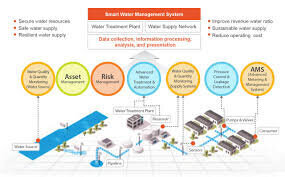Smart Water Management leverages advanced technologies such as artificial intelligence (AI) and the Internet of Things (IoT) to optimize the monitoring and management of water resources and infrastructure. This innovative approach addresses the pressing global challenges of water scarcity and inefficient resource use by enhancing operational efficiency and promoting conservation.
Role of AI in Water Management
AI plays a crucial role in transforming traditional water management practices into smart systems. By utilizing data-driven insights, AI can analyze vast amounts of information related to weather patterns, water quality, infrastructure conditions, and consumption trends. This enables water utilities to make informed decisions regarding water allocation and distribution, ultimately improving service delivery and reducing costs[1][3].
Key Technologies
-
Smart Water Meters: These devices provide real-time data on water consumption, allowing both utilities and consumers to monitor usage patterns. This transparency encourages responsible water use and facilitates immediate responses to anomalies such as leaks.
-
Connected Sensors: IoT-enabled sensors are deployed throughout water distribution networks to monitor various parameters, including pressure, flow rates, and water quality. AI algorithms analyze this data to detect leaks, predict maintenance needs, and optimize system performance[4][5].
-
Predictive Analytics: By analyzing historical data and current trends, AI can forecast future water demand. This predictive capability helps utilities plan resource allocation more effectively, preventing shortages and ensuring a consistent supply[5].
-
Digital Twins: These virtual models of water infrastructure enable utilities to simulate and analyze system performance under various conditions. By comparing real-time data with historical trends, utilities can predict failures and schedule maintenance proactively, thus extending the lifespan of their assets[4].
Benefits of Smart Water Management
The integration of AI and IoT in water management systems offers several significant benefits:
-
Efficiency: AI optimizes water distribution systems, reducing waste and enhancing operational efficiency. This is achieved through real-time monitoring and adaptive control of water flow and pressure[5].
-
Cost Savings: By preventing water losses through early leak detection and optimizing resource allocation, utilities can significantly reduce operational costs[3][5].
-
Environmental Conservation: Smart water management minimizes over-extraction and pollution, contributing to the preservation of ecosystems and promoting sustainable practices[5].
-
Data-Driven Decision Making: AI empowers water authorities with actionable insights, enabling informed long-term planning and resource management[1][2].
-
Resilience to Climate Change: AI systems can adapt to changing weather patterns, enhancing the resilience of water management systems against climate-related challenges[5].
Conclusion
The adoption of smart water management technologies represents a paradigm shift in how water resources are monitored and managed. By harnessing the power of AI and connected systems, utilities can achieve greater efficiency, reduce costs, and promote conservation efforts. As global water challenges intensify, the implementation of these innovative solutions will be crucial for ensuring sustainable water management for future generations[1][3][4].
Further Reading
1. https://www.adb.org/sites/default/files/publication/614891/artificial-intelligence-smart-water-management-systems.pdf
2. Using Artificial Intelligence for Smart Water Management Systems | Asian Development Bank
3. Exploring the rise of AI-based smart water management systems | Journal of Water Supply: Research and Technology-Aqua | IWA Publishing
4. Water AI: 8 Ways AI in Water Management Creates a Better Future
5. AI for Water Management: Smart Solutions for Conservation


